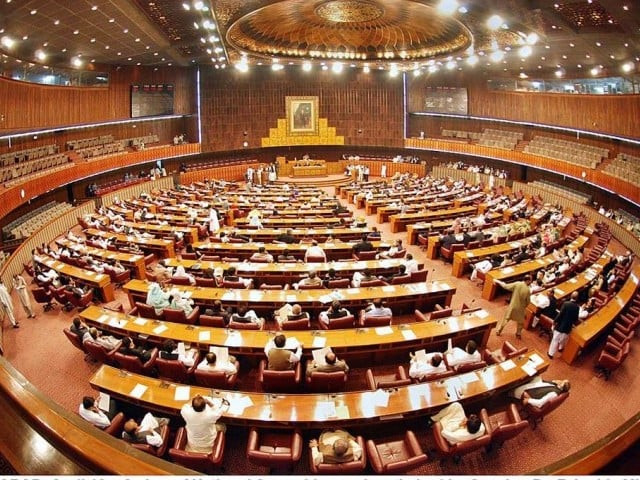Opposition from stakeholders: NA panel rejects move to increase SC strength
Proposal to allocate quota for women judges also turned down.

PHOTO: APP
A parliamentary panel has rejected a draft bill to increase the number of Supreme Court judges from 17 to 26, citing opposition from stakeholders. A move to allocate quota for women judges in SC was also rejected.
National Assembly Standing Committee on Law and Justice met on Monday with MNA Chaudhry Mahmood Bashir Virk in chair to deliberate on the matter.
The proposal to increase the number of judges was drafted by the Senate Committee of the Whole after discussions with stakeholders and decided that it would be moved jointly in the upper house of Parliament.
During Monday’s hearing of the NA committee, Special Assistant to the Prime Minister on Human Rights Barrister Zafarullah Khan told the panel that the government was not in favour of the move. Further, he said consultations with the legal fraternity, including bar councils who had apparently been overlooked by the Senate, too opposed the bill.
“Even the Supreme Court of Pakistan has opposed the idea of increasing the number [of judges],” he said.
This was a markedly different position that the government has adopted on the bill than when it supported it in the senate with around 15 senators from the treasury benches moving it in the Senate in January ahead of its passage from the Upper House.
Virk noted that the SC roster was already too high and instead of increasing it further, it should be reduced. “[Judges] do not do their actual work (disposing of cases) and [instead] take action on issues of socio-political nature to get fame and that which can keep them in the headlines.”
Pakistan Tehreek-e-Insaf (PTI) MNA Arif Alvi lamented that Pakistan was an over-legislated country and that the core issue was implementation, not creation of new laws.
“I am also about to table a mediation and arbitration bill in the NA which aims to lessen the burden on courts,” he maintained.
The special assistant noted that the number of suo motu actions taken by the superior judiciary had comparatively gone down, adding that the government was preparing a draft bill—cost and litigation—which would end around 80 per cent of frivolous petitions that are filed in courts.
Barrister Zafarullah further requested panel members if they could take up an amendment in the Central Law Officers Ordinance 1970 to rename post of standing counsel to assistant attorney general.

Another amendment was presented which restricts standing counsels, deputy attorney generals, and assistant attorney generals from private practice while holding public offices. The special assistant argued that it aims to end the conflict of interest that 130 such legal officers had in different courts of the country. The attorney general is already restricted from such a practice under the 18th Amendment. The motion was passed.
Women judges
The committee also rejected another amendment bill which sought to increase the number of women judges in the Supreme Court through a quota.
The bill in question sought to increase the number of female judges in SC to a third of the total judges on the bench.
Barrister Zafarullah pointed out that there was no constitutional restriction on appointing female judges on merit in the SC. He further argued that to date not a single woman had been appointed to the UK Court of Appeal (equivalent of SC) even on merit.
Deliberating about another bill from Sahibzada Tariqullah to amend the Code of Civil Procedure to “close all the delaying tactics in day-to-day adjournments in courts”, Zafarullah replied that the government was bringing an amendment to the Civil Procedure Court to end useless delays in adjournments.
Published in The Express Tribune, May 3rd, 2016.


















COMMENTS
Comments are moderated and generally will be posted if they are on-topic and not abusive.
For more information, please see our Comments FAQ